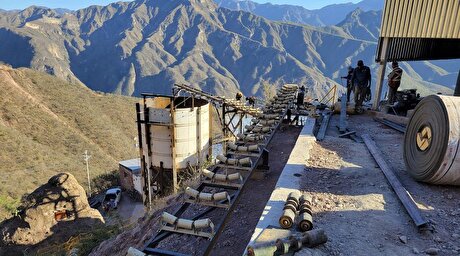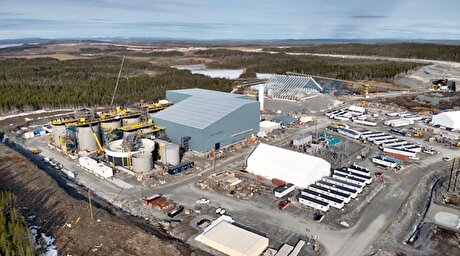
Supply issues, steel gains lift Indian iron ore prices

List prices of the main mining companies in January are higher by 8-30pc from the previous month. Prices of 63pc Roongta iron ore fines are higher by 29pc at 3,100 rupees/t, while Essel Mining's 63pc fines are higher by more than 13pc at Rs2,600/t, according to market participants. Essel has also lifted its 62.5pc basis lump price by 19pc at Rs4,400/t. Both mines are in east India's Odisha state, the country's largest iron ore producer.
State-controlled NMDC, India's largest iron ore producer, increased its January list price for 64pc iron ore fines by 8.5pc to Rs2,650/t, while it lifted the lump price by 8pc to Rs2,800/t. NMDC last increased prices in June 2019. These prices are limited to its main mining operations in the central Indian state of Chhattisgarh, while ore from its 7mn t/yr Kumaraswamy mine in south India's Karnataka state is sold via online auctions.
A cargo of 65.3pc iron ore fines, ex-mine Karnataka, was sold at an auction last week for Rs2,660/t.
Market participants expect iron ore prices to rise further this month, although opinion is divided on the extent of such an increase.
Indian mines often increase offer prices when steel prices are on the rise, with mills willing to pay a higher price in a bullish market. The monthly average of Argus-assessed domestic hot-rolled coil prices in December increased by 4pc from the previous month and by 5pc in January.
The expiry of leases in March this year for several operational mines, currently run by private-sector merchant mining firms, is the main reason for the acceleration in stocking up of iron ore by pellet and steel producers.
The expiring leases, with output of over 70mn t/yr of iron ore, have to be auctioned off but not a single mine has found a new owner yet. Odisha is auctioning 15 iron ore mines, for which it opened technical bids on 4 January, but it has not provided a final date for awarding the winning bids. These 15 mines produced 54mn t in the 2018-19 fiscal year ended 31 March. Other states such as Jharkhand and Chhattisgarh have not yet announced auctions of their expiring leases.
The government today amended the federal mining law to allow for the seamless transfer of regulatory approvals to new owners of operational iron ore mines.
Imports increase unlikely
Large-scale mills are stocking up 30-45 days of iron ore stocks as a buffer against a supply crunch, said the manager of a large mill. But some mills are still operating at around 10-15 days of stocks.
"There is no panic at all. Even if the mines are closed, they can still sell their accumulated stocks. Also we have to see what the government does to accelerate the mine auction process," said the manager of an integrated steel producer.
Private-sector mine owners have pre-booked future month iron ore orders to lock in current high prices, limiting spot availability of ores.
Iron ore imports may not increase to a significant extent in 2020 despite the domestic supply crunch, as the transportation of ore from ports to inland mills will add significantly to costs and may discourage such purchases.
But large-scale steel producers with ample cash flow and coastal plants, such as JSW Steel and AMNS India — formerly Essar Steel — could step up imports. JSW was India's largest iron ore importer in 2017-18 and 2018-19 as it bought millions of tonnes of Australian iron ore producer Fortescue's low-grade fines. But imports have been negligible in 2019-20.
"We don't think the auction process will have a significant impact on the seaborne market and we forecast India's net iron ore exports to decline by just 7mn t in 2020," said an analyst report by US bank Morgan Stanley. Mine stocks of more than 100mn t across India will provide a buffer to get over supply disruptions in 2020, it added.
But there are doubts on whether these stocks will find many takers, since the Fe grades are mostly sub-62pc that is not preferred by Indian mills and pellet producers.
By Prasenjit Bhattacharya


KoBold Metals granted lithium exploration rights in Congo

Freeport Indonesia to wrap up Gresik plant repairs by early September

Kyrgyzstan kicks off underground gold mining at Kumtor

Luca Mining expands Tahuehueto mine with Fresnillo land deal

Equinox Gold kicks off ore processing at Valentine mine

India considers easing restrictions on gold in pension funds

Critical Metals, Ucore ink 10-year offtake deal to supply rare earths to US plant

Critical Metals, Ucore ink 10-year offtake deal to supply rare earths to US plant

Equinox Gold kicks off ore processing at Valentine mine

India considers easing restrictions on gold in pension funds

Luca Mining expands Tahuehueto mine with Fresnillo land deal

Kyrgyzstan kicks off underground gold mining at Kumtor

Ukraine launches tender for major lithium deposit

KoBold Metals granted lithium exploration rights in Congo



















